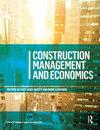Resolving learning paradoxes within a UK new-build housebuilder
IF 3.3
Q2 BUSINESS
引用次数: 0
Abstract
The build quality of new UK homes is negatively affected by poor quality management practices during the construction process. By implementing stringent quality management (QM) standards, housebuilders can improve build quality but implementing these organization-wide changes relies on housebuilder staff, designers and sub-contractors learning new working practices. This paper explores the tensions which emerge within housebuilders, as they implement new QM procedures. A longitudinal qualitative case study was conducted, where time was spent with housebuilder staff in three regional offices, two years apart. Methods include participant observation, semi-structured interviews and a review of organizational documentation. The findings highlight several learning paradoxes which arise at different stages of the housebuilding process and show how actors manage (or cope with) these paradoxes through their daily practices. This includes processes of simplifying and applying, improvising and problem-solving and aggregating and analyzing. Whilst these either-or approaches enable staff to resolve the immediate tensions that arise from different organizational processes, they often fail to meet longer-term learning objectives, detrimentally affecting build quality over time. Without structural changes to the way volume housebuilders annually report to both the UK Government and their shareholders, organizations in the UK housebuilding sector face challenges in reconciling different learning processes.解决英国新建房屋建筑商的学习悖论
在施工过程中,英国新住宅的建筑质量受到不良质量管理实践的负面影响。通过实施严格的质量管理(QM)标准,房屋建筑商可以提高建筑质量,但实施这些组织范围的变化依赖于房屋建筑商员工、设计师和分包商学习新的工作实践。本文探讨了住宅建筑商在实施新的质量管理程序时出现的紧张局势。进行了纵向定性案例研究,其中时间与三个区域办事处的房屋建筑商工作人员一起度过,间隔两年。方法包括参与者观察,半结构化访谈和组织文件的审查。研究结果强调了在房屋建造过程的不同阶段出现的几个学习悖论,并展示了演员如何通过日常实践来管理(或应对)这些悖论。这包括简化和应用、即兴发挥和解决问题以及汇总和分析的过程。虽然这些非此即彼的方法使员工能够解决来自不同组织过程的直接紧张关系,但它们通常无法满足长期学习目标,并随着时间的推移对构建质量产生不利影响。如果房屋建筑商每年向英国政府及其股东报告的方式没有结构性变化,英国房屋建筑行业的组织将面临协调不同学习过程的挑战。
本文章由计算机程序翻译,如有差异,请以英文原文为准。
求助全文
约1分钟内获得全文
求助全文
来源期刊

Construction Management and Economics
BUSINESS-
CiteScore
7.50
自引率
14.70%
发文量
58
期刊介绍:
Construction Management and Economics publishes high-quality original research concerning the management and economics of activity in the construction industry. Our concern is the production of the built environment. We seek to extend the concept of construction beyond on-site production to include a wide range of value-adding activities and involving coalitions of multiple actors, including clients and users, that evolve over time. We embrace the entire range of construction services provided by the architecture/engineering/construction sector, including design, procurement and through-life management. We welcome papers that demonstrate how the range of diverse academic and professional disciplines enable robust and novel theoretical, methodological and/or empirical insights into the world of construction. Ultimately, our aim is to inform and advance academic debates in the various disciplines that converge on the construction sector as a topic of research. While we expect papers to have strong theoretical positioning, we also seek contributions that offer critical, reflexive accounts on practice. Construction Management & Economics now publishes the following article types: -Research Papers -Notes - offering a comment on a previously published paper or report a new idea, empirical finding or approach. -Book Reviews -Letters - terse, scholarly comments on any aspect of interest to our readership. Commentaries -Obituaries - welcome in relation to significant figures in our field.
 求助内容:
求助内容: 应助结果提醒方式:
应助结果提醒方式:


